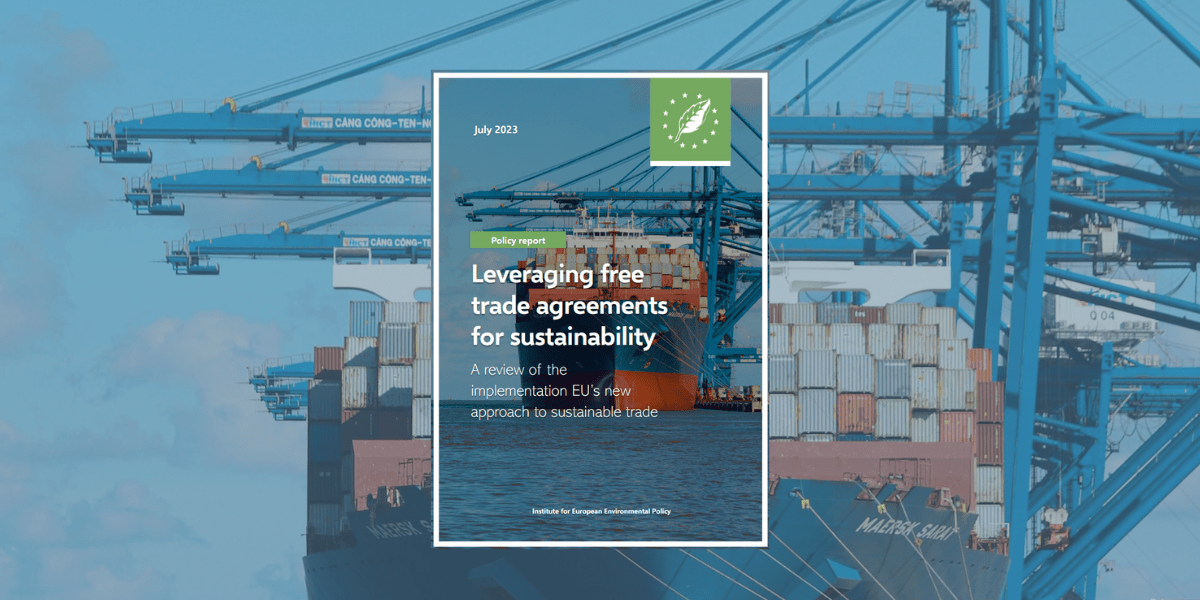AUTHORS: Eline Blot
This report assesses the implementation of the new Trade and Sustainable Development approach in the EU-Chile trade agreement and its potential contribution to sustainable trade.
In June 2022, the European Commission published a communication on the new approach to Trade and Sustainable Development (TSD) Chapters in its free trade agreements (FTAs) to address civil society’s concerns regarding the contribution of economic growth from trade liberalisation to global sustainability challenges.
In general, the new TSD Chapter approach is considered a step in the right direction to improve the sustainability provisions of EU FTAs. Yet, gaps remain as some of the most significant parts of the TSD review will not apply to existing FTAs, thereby limiting the scope of the new approach to deliver sustainable trade.
Moreover, compared to enforcement mechanisms in place in other major trade agreements such as the United States-Mexico-Canada Agreement (USMCA) and the Comprehensive and Progressive Agreement for Trans-Pacific Partnership (CPTPP), the EU’s new approach to TSD dispute settlement does not differ significantly. All three, have consultation processes, dispute settlement mechanisms and the possibility of sanctions, although the possible applicability of sanctions the latter differs depending on the language used in the provisions for labour and environment.
The EU’s approach to TSD non-compliance could stand to benefit from both the CPTPP and USMCA approaches. On one hand, the CPTPP has a more consultative but broader scope for sanctions for non-compliance with environmental provisions, and on the other hand, the USMCA has a targeted and fast approach to non-compliance with labour provisions.
Since the publication of the new approach to TSD Chapters, two FTAs have been concluded following this new approach, namely the EU-New Zealand and EU-Chile trade agreements. Initial reviews of both agreements’ TSD Chapters conclude a varied implementation of the Commission’s new TSD approach.
Although the contents of the EU-Chile TSD Chapter show a positive evolution compared to older FTAs, it does not match the ambition of the EU-New Zealand FTA. There is no possibility of sanctions for non-compliance with the Paris Agreement and fewer ambitious provisions to tackle fossil fuel subsidy reform and trade-related transport emissions. The lack of commitments and provisions for environmental protection and climate action in sector-specific Chapters of the agreement is a key gap in addressing the negative impacts of trade on sustainability, especially considering the importance of the mining sector in Chile.
Yet, there is still a possibility to bolster the sustainability credentials of the EU-Chile agreement. The TSD Chapter’s Article 26.23 “Review” obligates the TSD sub-committee to discuss how the effective implementation of the TSD provisions contributes to achieving the objectives of the Chapter, considering major policy developments and developments in international agreements.
There is still much to be done to develop trade agreements that embed and prioritise the protection of the environment and human rights. To support the advancement of sustainable trade best practices, the following recommendations for the negotiation and implementation phase of EU trade agreements are presented:
- Ambitiously implement the new TSD approach, along with accompanying implementation roadmaps to secure verifiable progress toward achieving environmental and climate targets.
- Extend the scope of sanctions for non-compliance with environmental objectives and allow for targeted actions, learning from the CPTPP and USMCA approaches.
- Expand the number of MEAs considered essential elements in FTAs.
- Mainstream the introduction of binding commitments to reduce and eliminate fossil fuel subsidies, and action to introduce and harmonise carbon pricing systems.
- Unbox sustainability provisions from the TSD Chapter into sector-specific chapters to encourage a high standard for environmental protection and sustainable, responsible business conduct.
- Leveraging the use of tariffs and non-tariff barriers to encourage trade in environmentally friendly goods and services, while discouraging trade in environmentally harmful goods and services.
At the multilateral level, the EU could pursue cooperation and mainstreaming of sustainable trade practices with like-minded countries by:
- Encouraging and improving access to green technologies and climate financing.
- Continue cooperation and participate in structured discussions on trade and environmental sustainability at the WTO, in particular at the Committee on Trade and Environment and the Trade and Environmental Sustainability Structured Discussions.
- Pursuing Trade and Environment Agreements, beginning with the Agreement on Climate Change, Trade and Sustainability (ACCTS).


